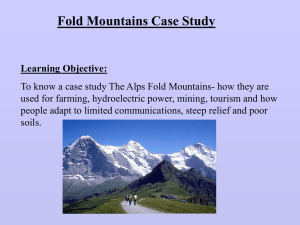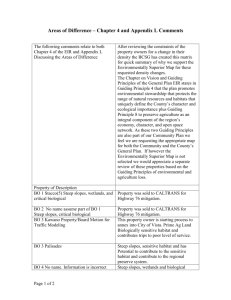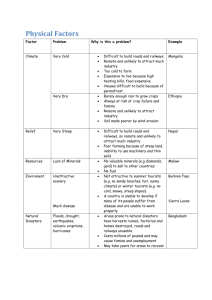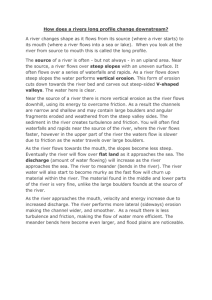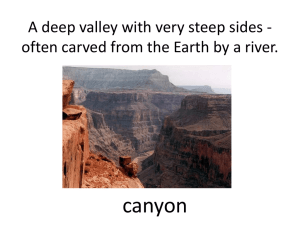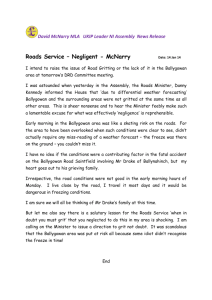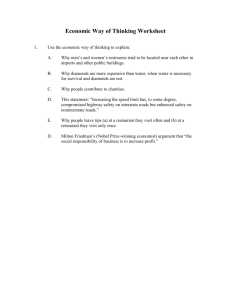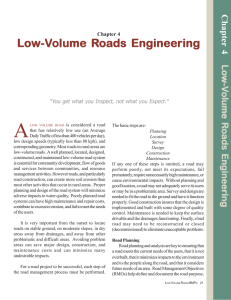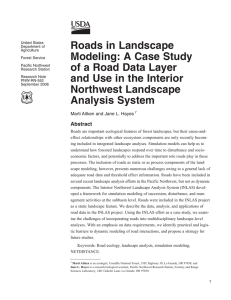Choosing Sites for Rural Land Uses
advertisement
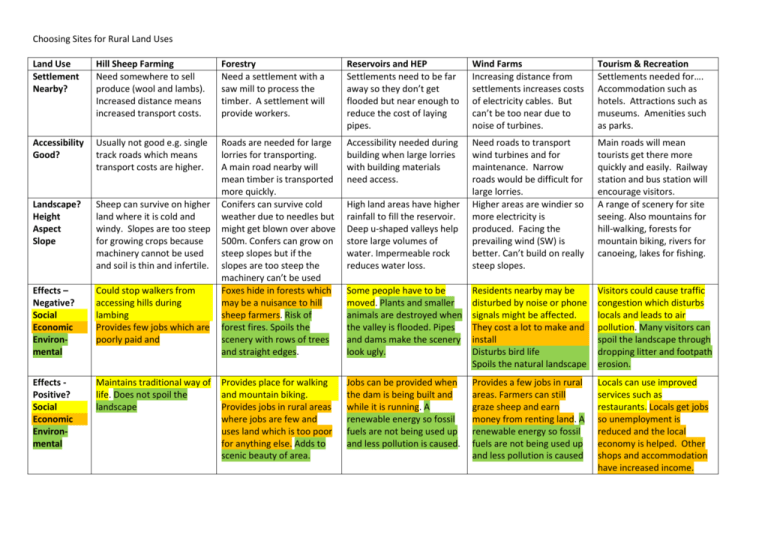
Choosing Sites for Rural Land Uses Land Use Settlement Nearby? Hill Sheep Farming Need somewhere to sell produce (wool and lambs). Increased distance means increased transport costs. Forestry Need a settlement with a saw mill to process the timber. A settlement will provide workers. Reservoirs and HEP Settlements need to be far away so they don’t get flooded but near enough to reduce the cost of laying pipes. Wind Farms Increasing distance from settlements increases costs of electricity cables. But can’t be too near due to noise of turbines. Tourism & Recreation Settlements needed for…. Accommodation such as hotels. Attractions such as museums. Amenities such as parks. Accessibility Good? Usually not good e.g. single track roads which means transport costs are higher. Accessibility needed during building when large lorries with building materials need access. Landscape? Height Aspect Slope Sheep can survive on higher land where it is cold and windy. Slopes are too steep for growing crops because machinery cannot be used and soil is thin and infertile. Need roads to transport wind turbines and for maintenance. Narrow roads would be difficult for large lorries. Higher areas are windier so more electricity is produced. Facing the prevailing wind (SW) is better. Can’t build on really steep slopes. Main roads will mean tourists get there more quickly and easily. Railway station and bus station will encourage visitors. A range of scenery for site seeing. Also mountains for hill-walking, forests for mountain biking, rivers for canoeing, lakes for fishing. Effects – Negative? Social Economic Environmental Could stop walkers from accessing hills during lambing Provides few jobs which are poorly paid and Roads are needed for large lorries for transporting. A main road nearby will mean timber is transported more quickly. Conifers can survive cold weather due to needles but might get blown over above 500m. Confers can grow on steep slopes but if the slopes are too steep the machinery can’t be used Foxes hide in forests which may be a nuisance to hill sheep farmers. Risk of forest fires. Spoils the scenery with rows of trees and straight edges. Some people have to be moved. Plants and smaller animals are destroyed when the valley is flooded. Pipes and dams make the scenery look ugly. Residents nearby may be disturbed by noise or phone signals might be affected. They cost a lot to make and install Disturbs bird life Spoils the natural landscape Visitors could cause traffic congestion which disturbs locals and leads to air pollution. Many visitors can spoil the landscape through dropping litter and footpath erosion. Effects Positive? Social Economic Environmental Maintains traditional way of life. Does not spoil the landscape Provides place for walking and mountain biking. Provides jobs in rural areas where jobs are few and uses land which is too poor for anything else. Adds to scenic beauty of area. Jobs can be provided when the dam is being built and while it is running. A renewable energy so fossil fuels are not being used up and less pollution is caused. Provides a few jobs in rural areas. Farmers can still graze sheep and earn money from renting land. A renewable energy so fossil fuels are not being used up and less pollution is caused Locals can use improved services such as restaurants. Locals get jobs so unemployment is reduced and the local economy is helped. Other shops and accommodation have increased income. High land areas have higher rainfall to fill the reservoir. Deep u-shaped valleys help store large volumes of water. Impermeable rock reduces water loss.
